Self-Awareness Report: Leadership, Decision Making, and Power Dynamics
VerifiedAdded on 2023/01/10
|14
|3743
|34
Report
AI Summary
This self-awareness report delves into various aspects of personal and professional development. It begins with an executive summary and a table of contents, setting the stage for an exploration of personality traits based on the Big Five model, with a focus on extraversion. The report then examines the individual's values and motivators, highlighting honesty, trust, creativity, and the drive for constant progress. It proceeds to analyze emotional intelligence, including self-management, self-awareness, social awareness, and relationship management. Furthermore, the report explores leadership styles, particularly servant or transformational leadership, and addresses the approach to power and politics. The discussion also covers decision-making theories and factors relevant to a graduate position or internship. The report concludes by emphasizing the importance of self-awareness in enhancing personal and professional growth. References are provided to support the analysis.

Self-awareness report
Name
Institution
Name
Institution
Paraphrase This Document
Need a fresh take? Get an instant paraphrase of this document with our AI Paraphraser
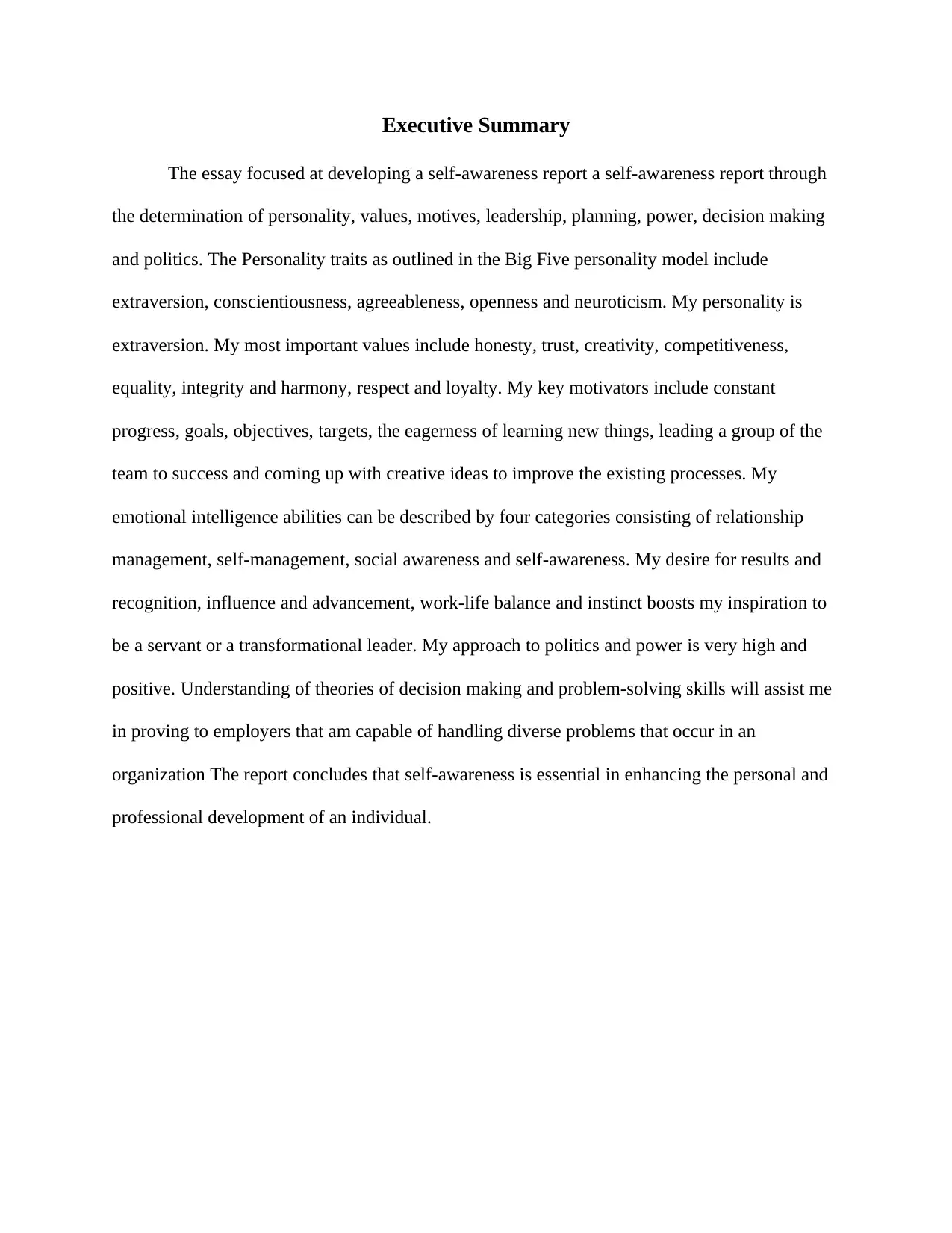
Executive Summary
The essay focused at developing a self-awareness report a self-awareness report through
the determination of personality, values, motives, leadership, planning, power, decision making
and politics. The Personality traits as outlined in the Big Five personality model include
extraversion, conscientiousness, agreeableness, openness and neuroticism. My personality is
extraversion. My most important values include honesty, trust, creativity, competitiveness,
equality, integrity and harmony, respect and loyalty. My key motivators include constant
progress, goals, objectives, targets, the eagerness of learning new things, leading a group of the
team to success and coming up with creative ideas to improve the existing processes. My
emotional intelligence abilities can be described by four categories consisting of relationship
management, self-management, social awareness and self-awareness. My desire for results and
recognition, influence and advancement, work-life balance and instinct boosts my inspiration to
be a servant or a transformational leader. My approach to politics and power is very high and
positive. Understanding of theories of decision making and problem-solving skills will assist me
in proving to employers that am capable of handling diverse problems that occur in an
organization The report concludes that self-awareness is essential in enhancing the personal and
professional development of an individual.
The essay focused at developing a self-awareness report a self-awareness report through
the determination of personality, values, motives, leadership, planning, power, decision making
and politics. The Personality traits as outlined in the Big Five personality model include
extraversion, conscientiousness, agreeableness, openness and neuroticism. My personality is
extraversion. My most important values include honesty, trust, creativity, competitiveness,
equality, integrity and harmony, respect and loyalty. My key motivators include constant
progress, goals, objectives, targets, the eagerness of learning new things, leading a group of the
team to success and coming up with creative ideas to improve the existing processes. My
emotional intelligence abilities can be described by four categories consisting of relationship
management, self-management, social awareness and self-awareness. My desire for results and
recognition, influence and advancement, work-life balance and instinct boosts my inspiration to
be a servant or a transformational leader. My approach to politics and power is very high and
positive. Understanding of theories of decision making and problem-solving skills will assist me
in proving to employers that am capable of handling diverse problems that occur in an
organization The report concludes that self-awareness is essential in enhancing the personal and
professional development of an individual.
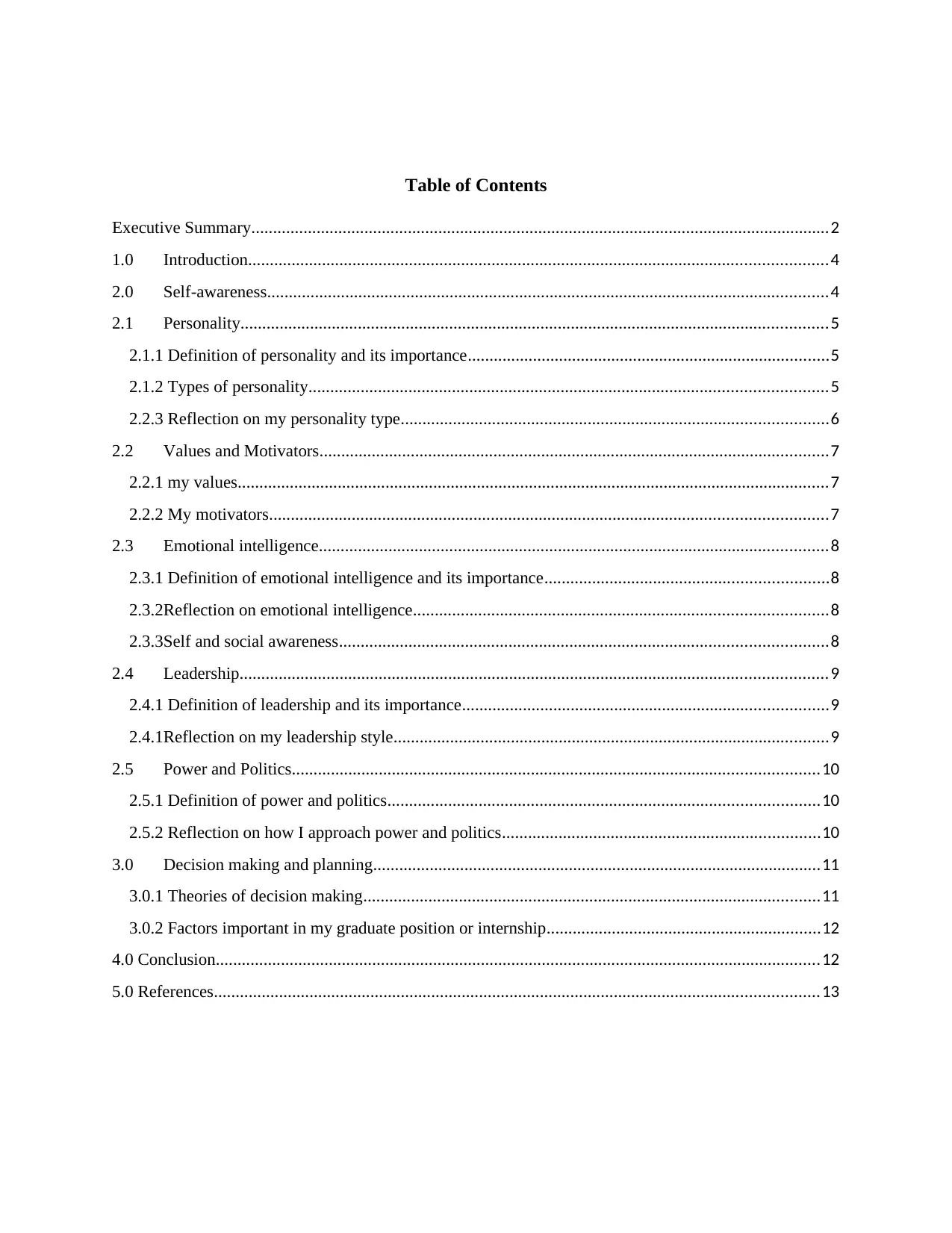
Table of Contents
Executive Summary.....................................................................................................................................2
1.0 Introduction.....................................................................................................................................4
2.0 Self-awareness.................................................................................................................................4
2.1 Personality.......................................................................................................................................5
2.1.1 Definition of personality and its importance...................................................................................5
2.1.2 Types of personality.......................................................................................................................5
2.2.3 Reflection on my personality type..................................................................................................6
2.2 Values and Motivators.....................................................................................................................7
2.2.1 my values........................................................................................................................................7
2.2.2 My motivators................................................................................................................................7
2.3 Emotional intelligence.....................................................................................................................8
2.3.1 Definition of emotional intelligence and its importance.................................................................8
2.3.2Reflection on emotional intelligence...............................................................................................8
2.3.3Self and social awareness................................................................................................................8
2.4 Leadership.......................................................................................................................................9
2.4.1 Definition of leadership and its importance....................................................................................9
2.4.1Reflection on my leadership style....................................................................................................9
2.5 Power and Politics.........................................................................................................................10
2.5.1 Definition of power and politics...................................................................................................10
2.5.2 Reflection on how I approach power and politics.........................................................................10
3.0 Decision making and planning.......................................................................................................11
3.0.1 Theories of decision making.........................................................................................................11
3.0.2 Factors important in my graduate position or internship...............................................................12
4.0 Conclusion...........................................................................................................................................12
5.0 References...........................................................................................................................................13
Executive Summary.....................................................................................................................................2
1.0 Introduction.....................................................................................................................................4
2.0 Self-awareness.................................................................................................................................4
2.1 Personality.......................................................................................................................................5
2.1.1 Definition of personality and its importance...................................................................................5
2.1.2 Types of personality.......................................................................................................................5
2.2.3 Reflection on my personality type..................................................................................................6
2.2 Values and Motivators.....................................................................................................................7
2.2.1 my values........................................................................................................................................7
2.2.2 My motivators................................................................................................................................7
2.3 Emotional intelligence.....................................................................................................................8
2.3.1 Definition of emotional intelligence and its importance.................................................................8
2.3.2Reflection on emotional intelligence...............................................................................................8
2.3.3Self and social awareness................................................................................................................8
2.4 Leadership.......................................................................................................................................9
2.4.1 Definition of leadership and its importance....................................................................................9
2.4.1Reflection on my leadership style....................................................................................................9
2.5 Power and Politics.........................................................................................................................10
2.5.1 Definition of power and politics...................................................................................................10
2.5.2 Reflection on how I approach power and politics.........................................................................10
3.0 Decision making and planning.......................................................................................................11
3.0.1 Theories of decision making.........................................................................................................11
3.0.2 Factors important in my graduate position or internship...............................................................12
4.0 Conclusion...........................................................................................................................................12
5.0 References...........................................................................................................................................13
⊘ This is a preview!⊘
Do you want full access?
Subscribe today to unlock all pages.

Trusted by 1+ million students worldwide
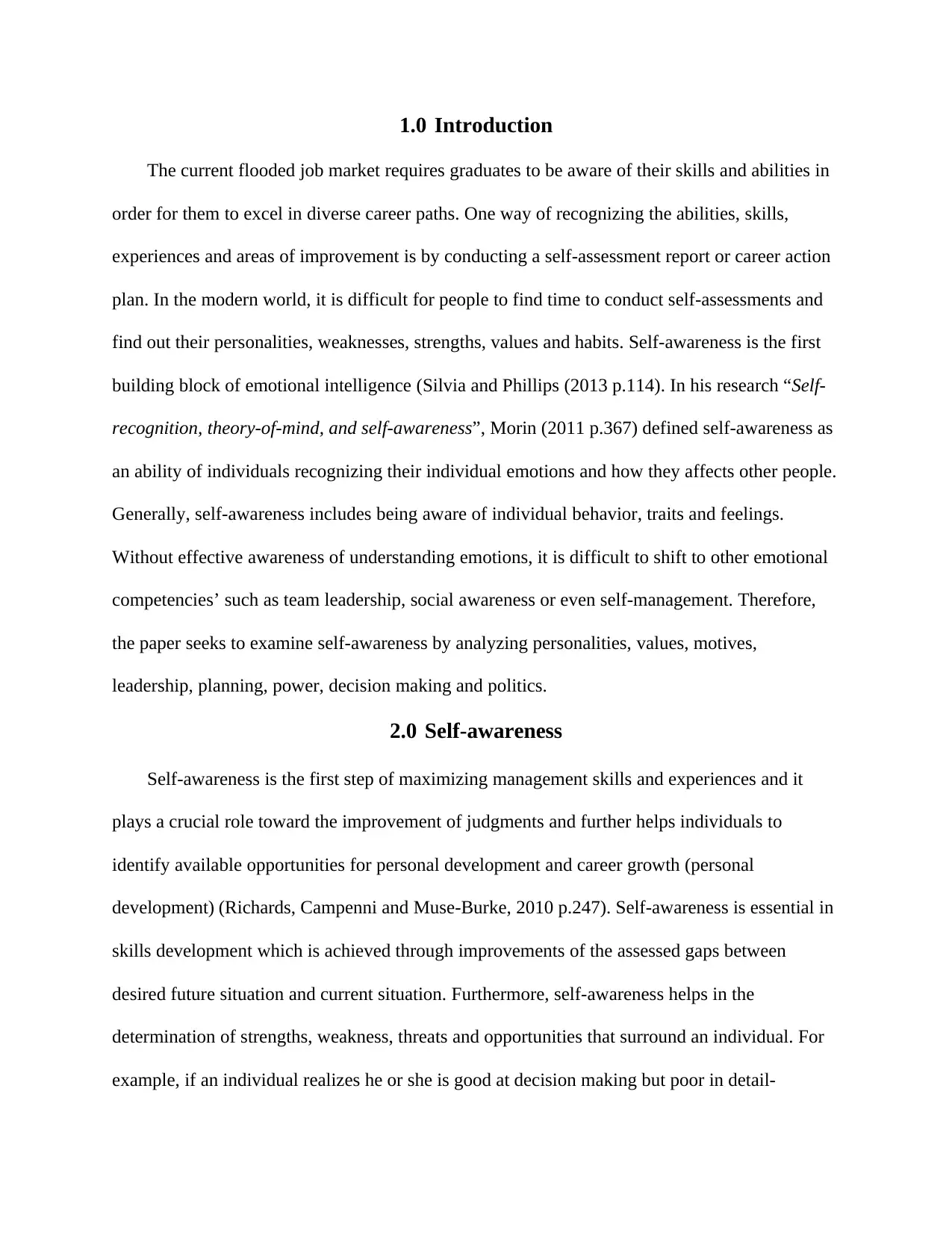
1.0 Introduction
The current flooded job market requires graduates to be aware of their skills and abilities in
order for them to excel in diverse career paths. One way of recognizing the abilities, skills,
experiences and areas of improvement is by conducting a self-assessment report or career action
plan. In the modern world, it is difficult for people to find time to conduct self-assessments and
find out their personalities, weaknesses, strengths, values and habits. Self-awareness is the first
building block of emotional intelligence (Silvia and Phillips (2013 p.114). In his research “Self-
recognition, theory-of-mind, and self-awareness”, Morin (2011 p.367) defined self-awareness as
an ability of individuals recognizing their individual emotions and how they affects other people.
Generally, self-awareness includes being aware of individual behavior, traits and feelings.
Without effective awareness of understanding emotions, it is difficult to shift to other emotional
competencies’ such as team leadership, social awareness or even self-management. Therefore,
the paper seeks to examine self-awareness by analyzing personalities, values, motives,
leadership, planning, power, decision making and politics.
2.0 Self-awareness
Self-awareness is the first step of maximizing management skills and experiences and it
plays a crucial role toward the improvement of judgments and further helps individuals to
identify available opportunities for personal development and career growth (personal
development) (Richards, Campenni and Muse-Burke, 2010 p.247). Self-awareness is essential in
skills development which is achieved through improvements of the assessed gaps between
desired future situation and current situation. Furthermore, self-awareness helps in the
determination of strengths, weakness, threats and opportunities that surround an individual. For
example, if an individual realizes he or she is good at decision making but poor in detail-
The current flooded job market requires graduates to be aware of their skills and abilities in
order for them to excel in diverse career paths. One way of recognizing the abilities, skills,
experiences and areas of improvement is by conducting a self-assessment report or career action
plan. In the modern world, it is difficult for people to find time to conduct self-assessments and
find out their personalities, weaknesses, strengths, values and habits. Self-awareness is the first
building block of emotional intelligence (Silvia and Phillips (2013 p.114). In his research “Self-
recognition, theory-of-mind, and self-awareness”, Morin (2011 p.367) defined self-awareness as
an ability of individuals recognizing their individual emotions and how they affects other people.
Generally, self-awareness includes being aware of individual behavior, traits and feelings.
Without effective awareness of understanding emotions, it is difficult to shift to other emotional
competencies’ such as team leadership, social awareness or even self-management. Therefore,
the paper seeks to examine self-awareness by analyzing personalities, values, motives,
leadership, planning, power, decision making and politics.
2.0 Self-awareness
Self-awareness is the first step of maximizing management skills and experiences and it
plays a crucial role toward the improvement of judgments and further helps individuals to
identify available opportunities for personal development and career growth (personal
development) (Richards, Campenni and Muse-Burke, 2010 p.247). Self-awareness is essential in
skills development which is achieved through improvements of the assessed gaps between
desired future situation and current situation. Furthermore, self-awareness helps in the
determination of strengths, weakness, threats and opportunities that surround an individual. For
example, if an individual realizes he or she is good at decision making but poor in detail-
Paraphrase This Document
Need a fresh take? Get an instant paraphrase of this document with our AI Paraphraser
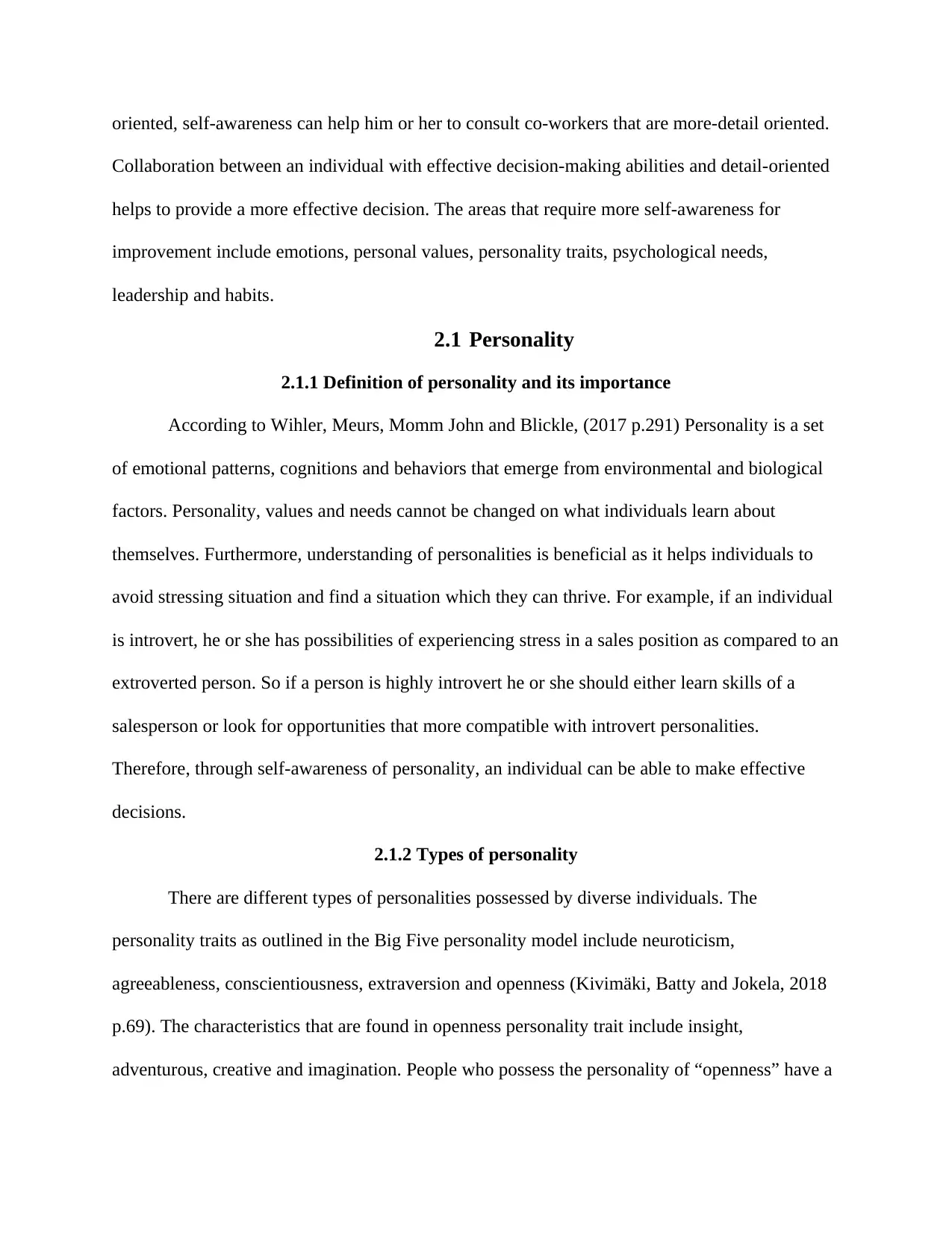
oriented, self-awareness can help him or her to consult co-workers that are more-detail oriented.
Collaboration between an individual with effective decision-making abilities and detail-oriented
helps to provide a more effective decision. The areas that require more self-awareness for
improvement include emotions, personal values, personality traits, psychological needs,
leadership and habits.
2.1 Personality
2.1.1 Definition of personality and its importance
According to Wihler, Meurs, Momm John and Blickle, (2017 p.291) Personality is a set
of emotional patterns, cognitions and behaviors that emerge from environmental and biological
factors. Personality, values and needs cannot be changed on what individuals learn about
themselves. Furthermore, understanding of personalities is beneficial as it helps individuals to
avoid stressing situation and find a situation which they can thrive. For example, if an individual
is introvert, he or she has possibilities of experiencing stress in a sales position as compared to an
extroverted person. So if a person is highly introvert he or she should either learn skills of a
salesperson or look for opportunities that more compatible with introvert personalities.
Therefore, through self-awareness of personality, an individual can be able to make effective
decisions.
2.1.2 Types of personality
There are different types of personalities possessed by diverse individuals. The
personality traits as outlined in the Big Five personality model include neuroticism,
agreeableness, conscientiousness, extraversion and openness (Kivimäki, Batty and Jokela, 2018
p.69). The characteristics that are found in openness personality trait include insight,
adventurous, creative and imagination. People who possess the personality of “openness” have a
Collaboration between an individual with effective decision-making abilities and detail-oriented
helps to provide a more effective decision. The areas that require more self-awareness for
improvement include emotions, personal values, personality traits, psychological needs,
leadership and habits.
2.1 Personality
2.1.1 Definition of personality and its importance
According to Wihler, Meurs, Momm John and Blickle, (2017 p.291) Personality is a set
of emotional patterns, cognitions and behaviors that emerge from environmental and biological
factors. Personality, values and needs cannot be changed on what individuals learn about
themselves. Furthermore, understanding of personalities is beneficial as it helps individuals to
avoid stressing situation and find a situation which they can thrive. For example, if an individual
is introvert, he or she has possibilities of experiencing stress in a sales position as compared to an
extroverted person. So if a person is highly introvert he or she should either learn skills of a
salesperson or look for opportunities that more compatible with introvert personalities.
Therefore, through self-awareness of personality, an individual can be able to make effective
decisions.
2.1.2 Types of personality
There are different types of personalities possessed by diverse individuals. The
personality traits as outlined in the Big Five personality model include neuroticism,
agreeableness, conscientiousness, extraversion and openness (Kivimäki, Batty and Jokela, 2018
p.69). The characteristics that are found in openness personality trait include insight,
adventurous, creative and imagination. People who possess the personality of “openness” have a
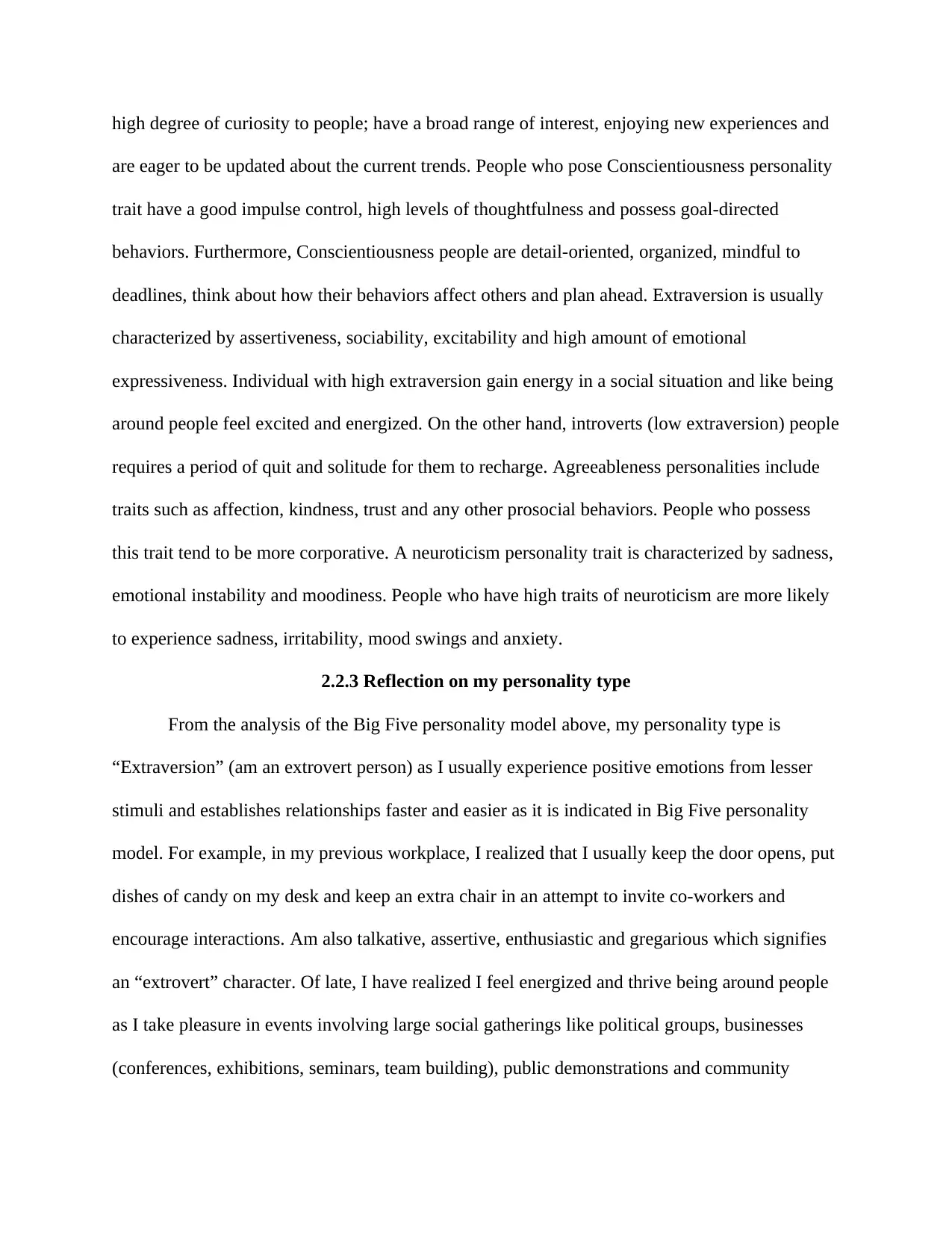
high degree of curiosity to people; have a broad range of interest, enjoying new experiences and
are eager to be updated about the current trends. People who pose Conscientiousness personality
trait have a good impulse control, high levels of thoughtfulness and possess goal-directed
behaviors. Furthermore, Conscientiousness people are detail-oriented, organized, mindful to
deadlines, think about how their behaviors affect others and plan ahead. Extraversion is usually
characterized by assertiveness, sociability, excitability and high amount of emotional
expressiveness. Individual with high extraversion gain energy in a social situation and like being
around people feel excited and energized. On the other hand, introverts (low extraversion) people
requires a period of quit and solitude for them to recharge. Agreeableness personalities include
traits such as affection, kindness, trust and any other prosocial behaviors. People who possess
this trait tend to be more corporative. A neuroticism personality trait is characterized by sadness,
emotional instability and moodiness. People who have high traits of neuroticism are more likely
to experience sadness, irritability, mood swings and anxiety.
2.2.3 Reflection on my personality type
From the analysis of the Big Five personality model above, my personality type is
“Extraversion” (am an extrovert person) as I usually experience positive emotions from lesser
stimuli and establishes relationships faster and easier as it is indicated in Big Five personality
model. For example, in my previous workplace, I realized that I usually keep the door opens, put
dishes of candy on my desk and keep an extra chair in an attempt to invite co-workers and
encourage interactions. Am also talkative, assertive, enthusiastic and gregarious which signifies
an “extrovert” character. Of late, I have realized I feel energized and thrive being around people
as I take pleasure in events involving large social gatherings like political groups, businesses
(conferences, exhibitions, seminars, team building), public demonstrations and community
are eager to be updated about the current trends. People who pose Conscientiousness personality
trait have a good impulse control, high levels of thoughtfulness and possess goal-directed
behaviors. Furthermore, Conscientiousness people are detail-oriented, organized, mindful to
deadlines, think about how their behaviors affect others and plan ahead. Extraversion is usually
characterized by assertiveness, sociability, excitability and high amount of emotional
expressiveness. Individual with high extraversion gain energy in a social situation and like being
around people feel excited and energized. On the other hand, introverts (low extraversion) people
requires a period of quit and solitude for them to recharge. Agreeableness personalities include
traits such as affection, kindness, trust and any other prosocial behaviors. People who possess
this trait tend to be more corporative. A neuroticism personality trait is characterized by sadness,
emotional instability and moodiness. People who have high traits of neuroticism are more likely
to experience sadness, irritability, mood swings and anxiety.
2.2.3 Reflection on my personality type
From the analysis of the Big Five personality model above, my personality type is
“Extraversion” (am an extrovert person) as I usually experience positive emotions from lesser
stimuli and establishes relationships faster and easier as it is indicated in Big Five personality
model. For example, in my previous workplace, I realized that I usually keep the door opens, put
dishes of candy on my desk and keep an extra chair in an attempt to invite co-workers and
encourage interactions. Am also talkative, assertive, enthusiastic and gregarious which signifies
an “extrovert” character. Of late, I have realized I feel energized and thrive being around people
as I take pleasure in events involving large social gatherings like political groups, businesses
(conferences, exhibitions, seminars, team building), public demonstrations and community
⊘ This is a preview!⊘
Do you want full access?
Subscribe today to unlock all pages.

Trusted by 1+ million students worldwide
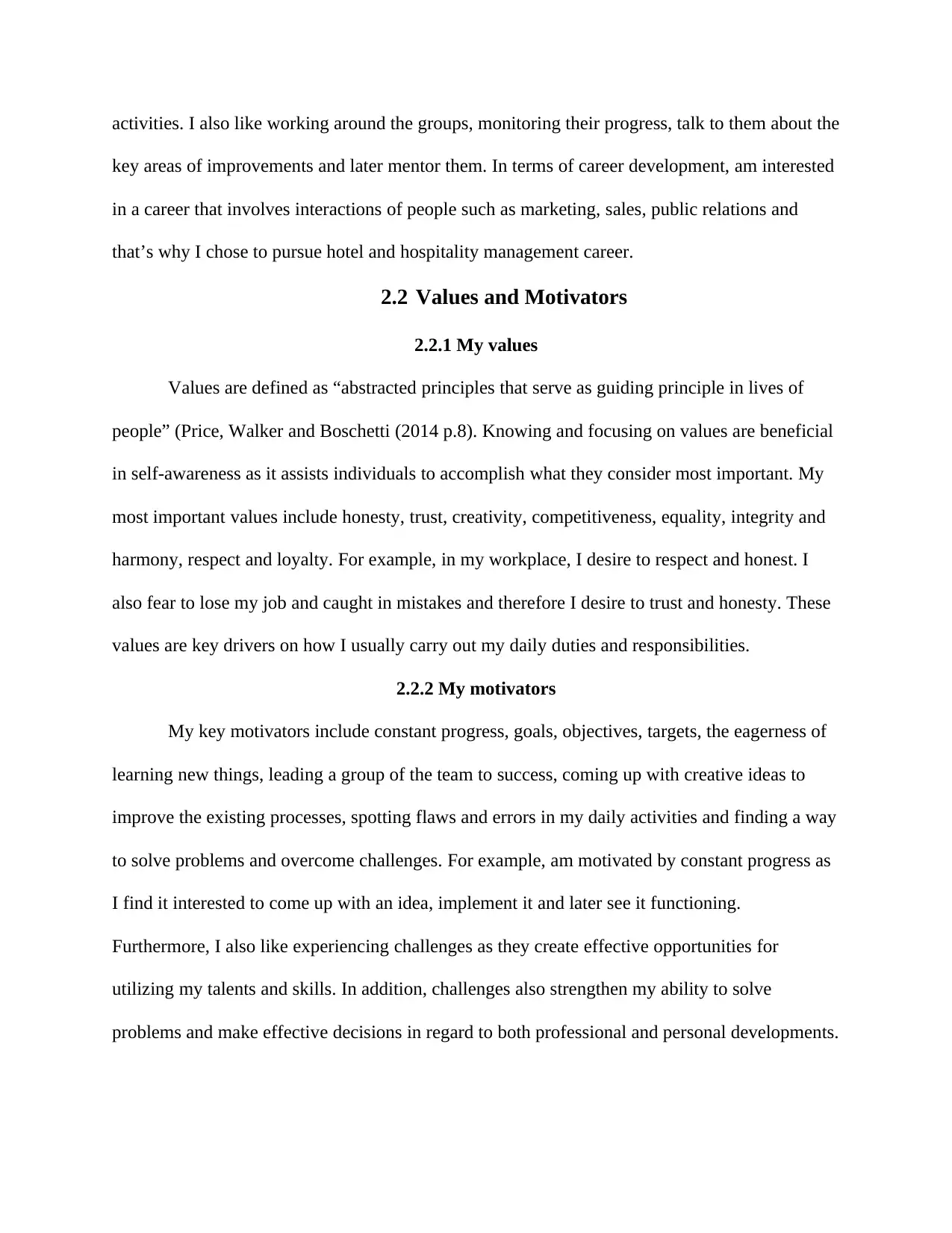
activities. I also like working around the groups, monitoring their progress, talk to them about the
key areas of improvements and later mentor them. In terms of career development, am interested
in a career that involves interactions of people such as marketing, sales, public relations and
that’s why I chose to pursue hotel and hospitality management career.
2.2 Values and Motivators
2.2.1 My values
Values are defined as “abstracted principles that serve as guiding principle in lives of
people” (Price, Walker and Boschetti (2014 p.8). Knowing and focusing on values are beneficial
in self-awareness as it assists individuals to accomplish what they consider most important. My
most important values include honesty, trust, creativity, competitiveness, equality, integrity and
harmony, respect and loyalty. For example, in my workplace, I desire to respect and honest. I
also fear to lose my job and caught in mistakes and therefore I desire to trust and honesty. These
values are key drivers on how I usually carry out my daily duties and responsibilities.
2.2.2 My motivators
My key motivators include constant progress, goals, objectives, targets, the eagerness of
learning new things, leading a group of the team to success, coming up with creative ideas to
improve the existing processes, spotting flaws and errors in my daily activities and finding a way
to solve problems and overcome challenges. For example, am motivated by constant progress as
I find it interested to come up with an idea, implement it and later see it functioning.
Furthermore, I also like experiencing challenges as they create effective opportunities for
utilizing my talents and skills. In addition, challenges also strengthen my ability to solve
problems and make effective decisions in regard to both professional and personal developments.
key areas of improvements and later mentor them. In terms of career development, am interested
in a career that involves interactions of people such as marketing, sales, public relations and
that’s why I chose to pursue hotel and hospitality management career.
2.2 Values and Motivators
2.2.1 My values
Values are defined as “abstracted principles that serve as guiding principle in lives of
people” (Price, Walker and Boschetti (2014 p.8). Knowing and focusing on values are beneficial
in self-awareness as it assists individuals to accomplish what they consider most important. My
most important values include honesty, trust, creativity, competitiveness, equality, integrity and
harmony, respect and loyalty. For example, in my workplace, I desire to respect and honest. I
also fear to lose my job and caught in mistakes and therefore I desire to trust and honesty. These
values are key drivers on how I usually carry out my daily duties and responsibilities.
2.2.2 My motivators
My key motivators include constant progress, goals, objectives, targets, the eagerness of
learning new things, leading a group of the team to success, coming up with creative ideas to
improve the existing processes, spotting flaws and errors in my daily activities and finding a way
to solve problems and overcome challenges. For example, am motivated by constant progress as
I find it interested to come up with an idea, implement it and later see it functioning.
Furthermore, I also like experiencing challenges as they create effective opportunities for
utilizing my talents and skills. In addition, challenges also strengthen my ability to solve
problems and make effective decisions in regard to both professional and personal developments.
Paraphrase This Document
Need a fresh take? Get an instant paraphrase of this document with our AI Paraphraser
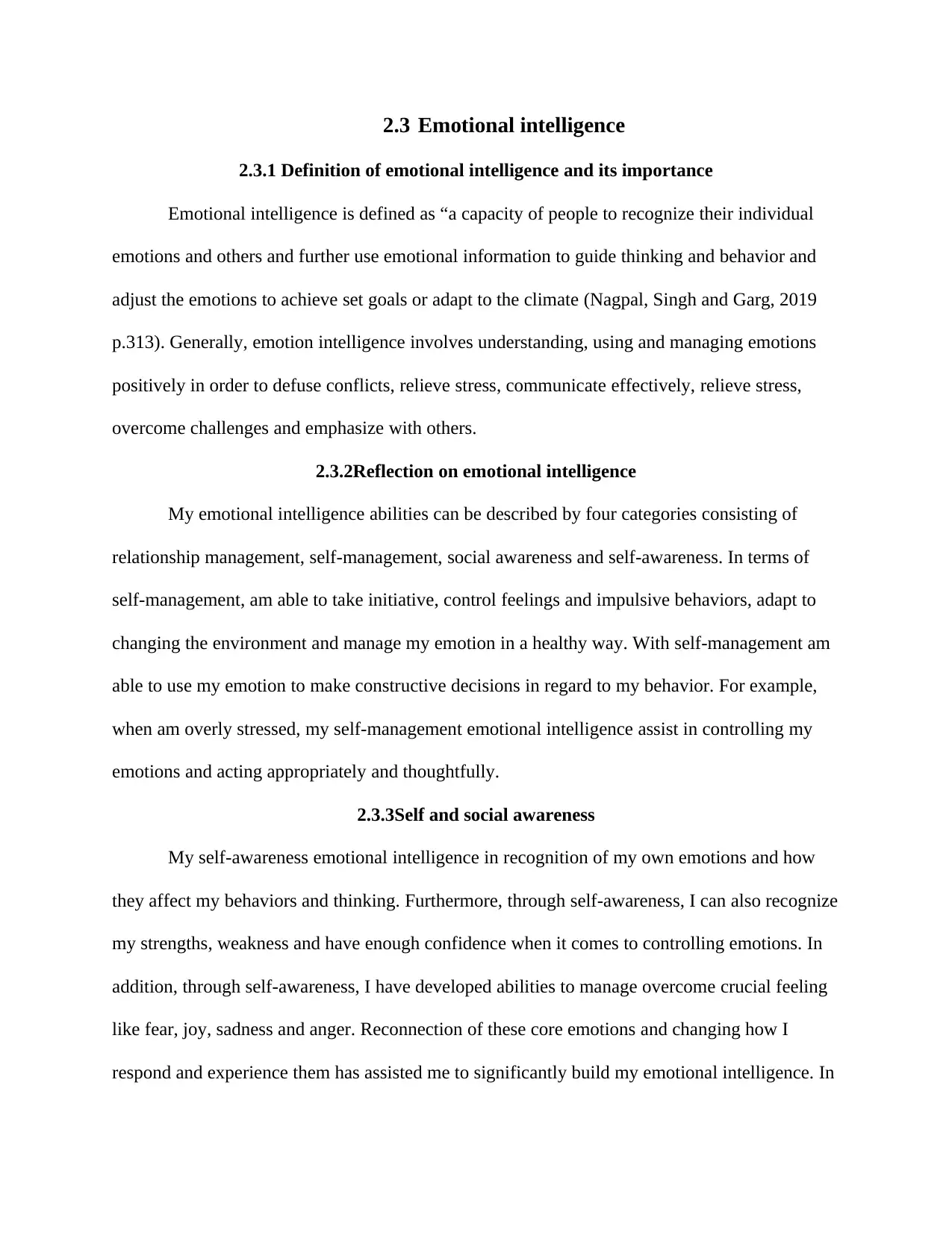
2.3 Emotional intelligence
2.3.1 Definition of emotional intelligence and its importance
Emotional intelligence is defined as “a capacity of people to recognize their individual
emotions and others and further use emotional information to guide thinking and behavior and
adjust the emotions to achieve set goals or adapt to the climate (Nagpal, Singh and Garg, 2019
p.313). Generally, emotion intelligence involves understanding, using and managing emotions
positively in order to defuse conflicts, relieve stress, communicate effectively, relieve stress,
overcome challenges and emphasize with others.
2.3.2Reflection on emotional intelligence
My emotional intelligence abilities can be described by four categories consisting of
relationship management, self-management, social awareness and self-awareness. In terms of
self-management, am able to take initiative, control feelings and impulsive behaviors, adapt to
changing the environment and manage my emotion in a healthy way. With self-management am
able to use my emotion to make constructive decisions in regard to my behavior. For example,
when am overly stressed, my self-management emotional intelligence assist in controlling my
emotions and acting appropriately and thoughtfully.
2.3.3Self and social awareness
My self-awareness emotional intelligence in recognition of my own emotions and how
they affect my behaviors and thinking. Furthermore, through self-awareness, I can also recognize
my strengths, weakness and have enough confidence when it comes to controlling emotions. In
addition, through self-awareness, I have developed abilities to manage overcome crucial feeling
like fear, joy, sadness and anger. Reconnection of these core emotions and changing how I
respond and experience them has assisted me to significantly build my emotional intelligence. In
2.3.1 Definition of emotional intelligence and its importance
Emotional intelligence is defined as “a capacity of people to recognize their individual
emotions and others and further use emotional information to guide thinking and behavior and
adjust the emotions to achieve set goals or adapt to the climate (Nagpal, Singh and Garg, 2019
p.313). Generally, emotion intelligence involves understanding, using and managing emotions
positively in order to defuse conflicts, relieve stress, communicate effectively, relieve stress,
overcome challenges and emphasize with others.
2.3.2Reflection on emotional intelligence
My emotional intelligence abilities can be described by four categories consisting of
relationship management, self-management, social awareness and self-awareness. In terms of
self-management, am able to take initiative, control feelings and impulsive behaviors, adapt to
changing the environment and manage my emotion in a healthy way. With self-management am
able to use my emotion to make constructive decisions in regard to my behavior. For example,
when am overly stressed, my self-management emotional intelligence assist in controlling my
emotions and acting appropriately and thoughtfully.
2.3.3Self and social awareness
My self-awareness emotional intelligence in recognition of my own emotions and how
they affect my behaviors and thinking. Furthermore, through self-awareness, I can also recognize
my strengths, weakness and have enough confidence when it comes to controlling emotions. In
addition, through self-awareness, I have developed abilities to manage overcome crucial feeling
like fear, joy, sadness and anger. Reconnection of these core emotions and changing how I
respond and experience them has assisted me to significantly build my emotional intelligence. In
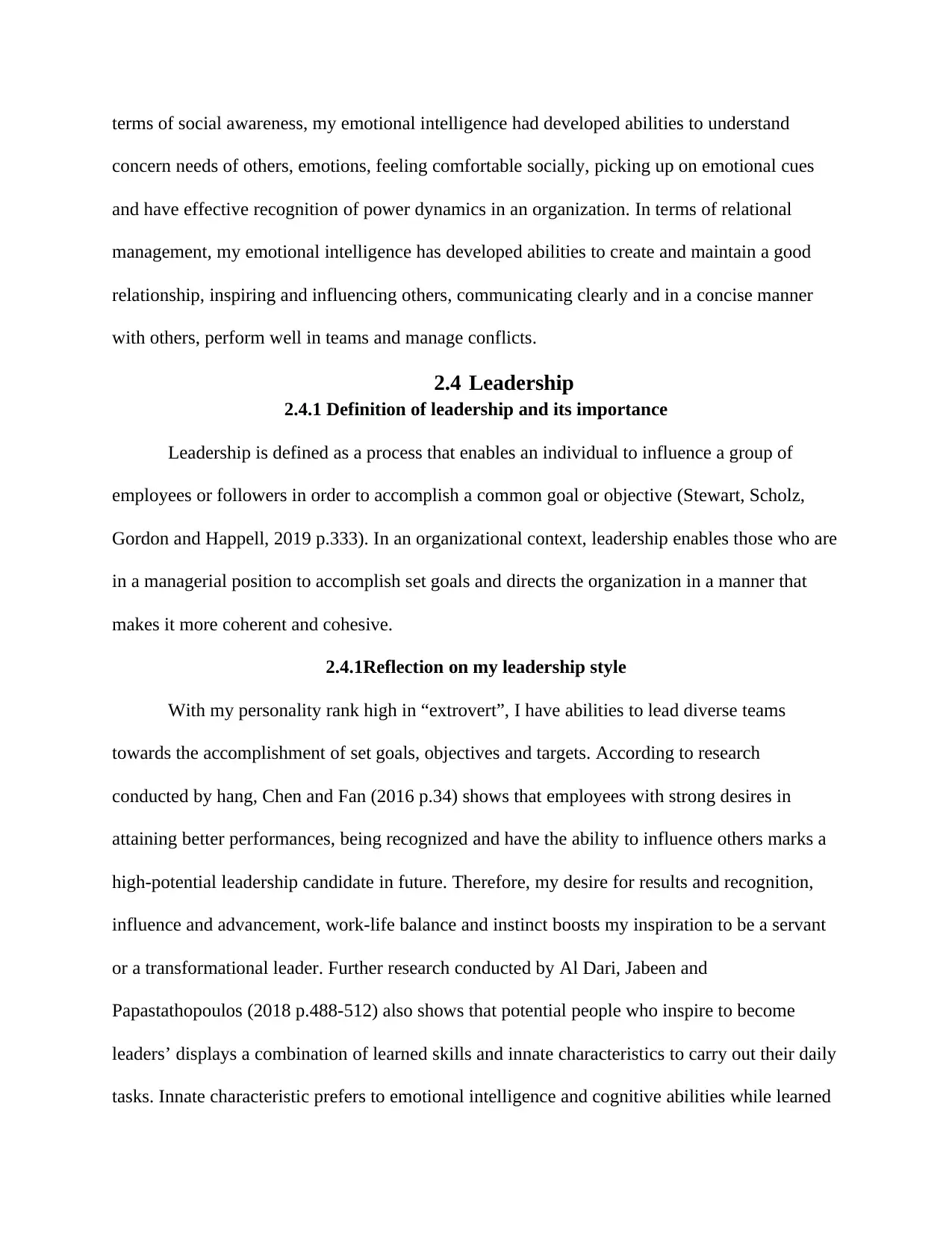
terms of social awareness, my emotional intelligence had developed abilities to understand
concern needs of others, emotions, feeling comfortable socially, picking up on emotional cues
and have effective recognition of power dynamics in an organization. In terms of relational
management, my emotional intelligence has developed abilities to create and maintain a good
relationship, inspiring and influencing others, communicating clearly and in a concise manner
with others, perform well in teams and manage conflicts.
2.4 Leadership
2.4.1 Definition of leadership and its importance
Leadership is defined as a process that enables an individual to influence a group of
employees or followers in order to accomplish a common goal or objective (Stewart, Scholz,
Gordon and Happell, 2019 p.333). In an organizational context, leadership enables those who are
in a managerial position to accomplish set goals and directs the organization in a manner that
makes it more coherent and cohesive.
2.4.1Reflection on my leadership style
With my personality rank high in “extrovert”, I have abilities to lead diverse teams
towards the accomplishment of set goals, objectives and targets. According to research
conducted by hang, Chen and Fan (2016 p.34) shows that employees with strong desires in
attaining better performances, being recognized and have the ability to influence others marks a
high-potential leadership candidate in future. Therefore, my desire for results and recognition,
influence and advancement, work-life balance and instinct boosts my inspiration to be a servant
or a transformational leader. Further research conducted by Al Dari, Jabeen and
Papastathopoulos (2018 p.488-512) also shows that potential people who inspire to become
leaders’ displays a combination of learned skills and innate characteristics to carry out their daily
tasks. Innate characteristic prefers to emotional intelligence and cognitive abilities while learned
concern needs of others, emotions, feeling comfortable socially, picking up on emotional cues
and have effective recognition of power dynamics in an organization. In terms of relational
management, my emotional intelligence has developed abilities to create and maintain a good
relationship, inspiring and influencing others, communicating clearly and in a concise manner
with others, perform well in teams and manage conflicts.
2.4 Leadership
2.4.1 Definition of leadership and its importance
Leadership is defined as a process that enables an individual to influence a group of
employees or followers in order to accomplish a common goal or objective (Stewart, Scholz,
Gordon and Happell, 2019 p.333). In an organizational context, leadership enables those who are
in a managerial position to accomplish set goals and directs the organization in a manner that
makes it more coherent and cohesive.
2.4.1Reflection on my leadership style
With my personality rank high in “extrovert”, I have abilities to lead diverse teams
towards the accomplishment of set goals, objectives and targets. According to research
conducted by hang, Chen and Fan (2016 p.34) shows that employees with strong desires in
attaining better performances, being recognized and have the ability to influence others marks a
high-potential leadership candidate in future. Therefore, my desire for results and recognition,
influence and advancement, work-life balance and instinct boosts my inspiration to be a servant
or a transformational leader. Further research conducted by Al Dari, Jabeen and
Papastathopoulos (2018 p.488-512) also shows that potential people who inspire to become
leaders’ displays a combination of learned skills and innate characteristics to carry out their daily
tasks. Innate characteristic prefers to emotional intelligence and cognitive abilities while learned
⊘ This is a preview!⊘
Do you want full access?
Subscribe today to unlock all pages.

Trusted by 1+ million students worldwide
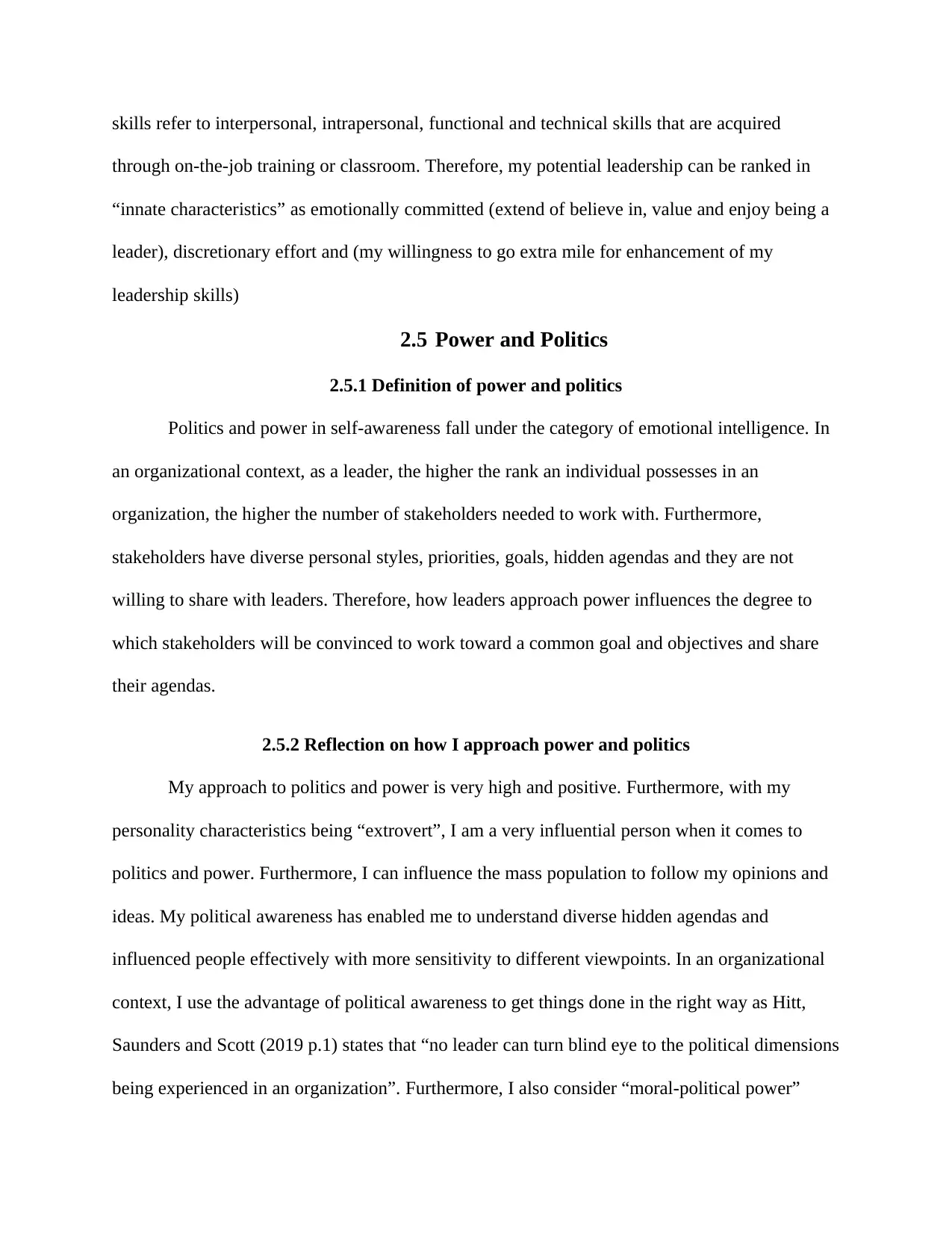
skills refer to interpersonal, intrapersonal, functional and technical skills that are acquired
through on-the-job training or classroom. Therefore, my potential leadership can be ranked in
“innate characteristics” as emotionally committed (extend of believe in, value and enjoy being a
leader), discretionary effort and (my willingness to go extra mile for enhancement of my
leadership skills)
2.5 Power and Politics
2.5.1 Definition of power and politics
Politics and power in self-awareness fall under the category of emotional intelligence. In
an organizational context, as a leader, the higher the rank an individual possesses in an
organization, the higher the number of stakeholders needed to work with. Furthermore,
stakeholders have diverse personal styles, priorities, goals, hidden agendas and they are not
willing to share with leaders. Therefore, how leaders approach power influences the degree to
which stakeholders will be convinced to work toward a common goal and objectives and share
their agendas.
2.5.2 Reflection on how I approach power and politics
My approach to politics and power is very high and positive. Furthermore, with my
personality characteristics being “extrovert”, I am a very influential person when it comes to
politics and power. Furthermore, I can influence the mass population to follow my opinions and
ideas. My political awareness has enabled me to understand diverse hidden agendas and
influenced people effectively with more sensitivity to different viewpoints. In an organizational
context, I use the advantage of political awareness to get things done in the right way as Hitt,
Saunders and Scott (2019 p.1) states that “no leader can turn blind eye to the political dimensions
being experienced in an organization”. Furthermore, I also consider “moral-political power”
through on-the-job training or classroom. Therefore, my potential leadership can be ranked in
“innate characteristics” as emotionally committed (extend of believe in, value and enjoy being a
leader), discretionary effort and (my willingness to go extra mile for enhancement of my
leadership skills)
2.5 Power and Politics
2.5.1 Definition of power and politics
Politics and power in self-awareness fall under the category of emotional intelligence. In
an organizational context, as a leader, the higher the rank an individual possesses in an
organization, the higher the number of stakeholders needed to work with. Furthermore,
stakeholders have diverse personal styles, priorities, goals, hidden agendas and they are not
willing to share with leaders. Therefore, how leaders approach power influences the degree to
which stakeholders will be convinced to work toward a common goal and objectives and share
their agendas.
2.5.2 Reflection on how I approach power and politics
My approach to politics and power is very high and positive. Furthermore, with my
personality characteristics being “extrovert”, I am a very influential person when it comes to
politics and power. Furthermore, I can influence the mass population to follow my opinions and
ideas. My political awareness has enabled me to understand diverse hidden agendas and
influenced people effectively with more sensitivity to different viewpoints. In an organizational
context, I use the advantage of political awareness to get things done in the right way as Hitt,
Saunders and Scott (2019 p.1) states that “no leader can turn blind eye to the political dimensions
being experienced in an organization”. Furthermore, I also consider “moral-political power”
Paraphrase This Document
Need a fresh take? Get an instant paraphrase of this document with our AI Paraphraser
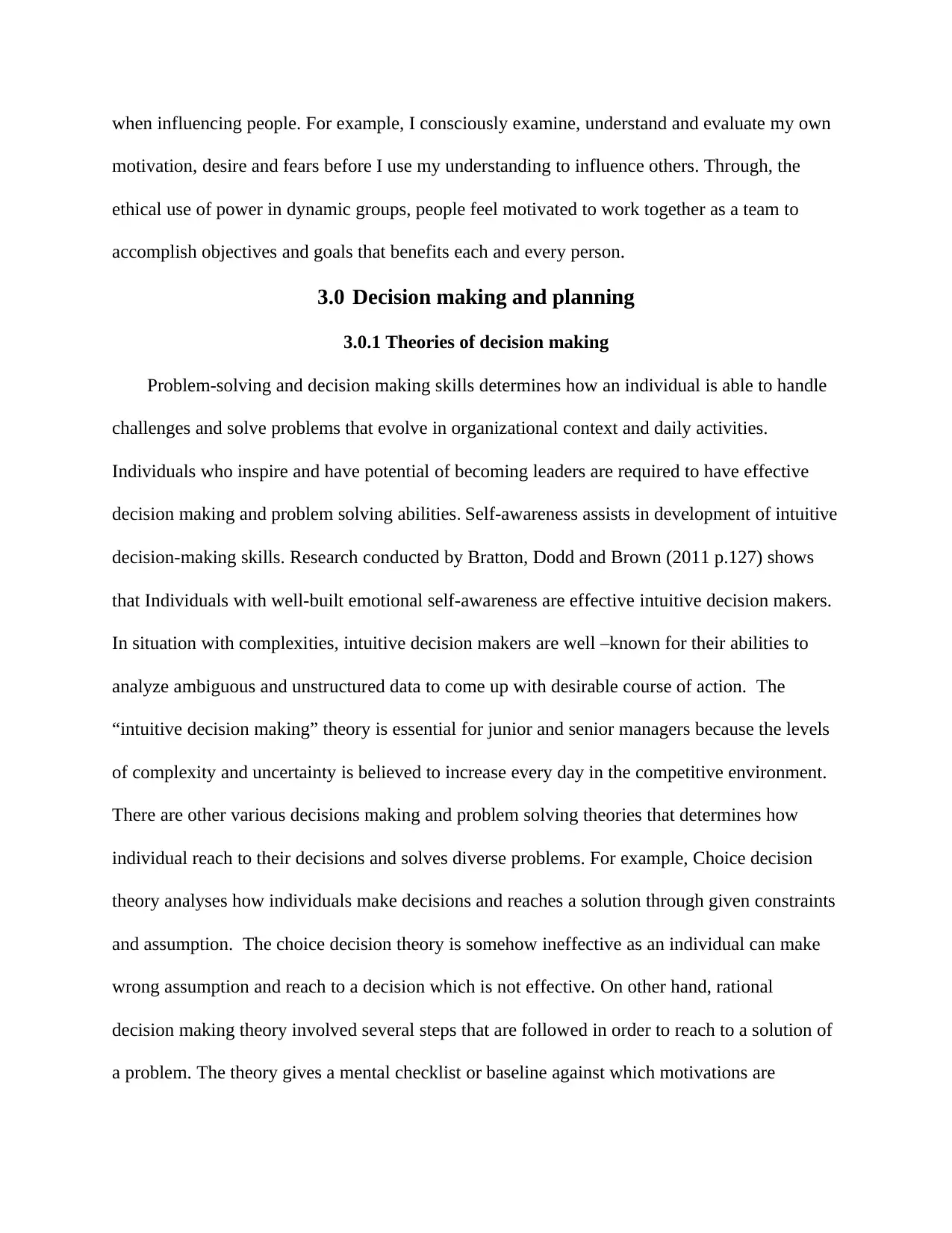
when influencing people. For example, I consciously examine, understand and evaluate my own
motivation, desire and fears before I use my understanding to influence others. Through, the
ethical use of power in dynamic groups, people feel motivated to work together as a team to
accomplish objectives and goals that benefits each and every person.
3.0 Decision making and planning
3.0.1 Theories of decision making
Problem-solving and decision making skills determines how an individual is able to handle
challenges and solve problems that evolve in organizational context and daily activities.
Individuals who inspire and have potential of becoming leaders are required to have effective
decision making and problem solving abilities. Self-awareness assists in development of intuitive
decision-making skills. Research conducted by Bratton, Dodd and Brown (2011 p.127) shows
that Individuals with well-built emotional self-awareness are effective intuitive decision makers.
In situation with complexities, intuitive decision makers are well –known for their abilities to
analyze ambiguous and unstructured data to come up with desirable course of action. The
“intuitive decision making” theory is essential for junior and senior managers because the levels
of complexity and uncertainty is believed to increase every day in the competitive environment.
There are other various decisions making and problem solving theories that determines how
individual reach to their decisions and solves diverse problems. For example, Choice decision
theory analyses how individuals make decisions and reaches a solution through given constraints
and assumption. The choice decision theory is somehow ineffective as an individual can make
wrong assumption and reach to a decision which is not effective. On other hand, rational
decision making theory involved several steps that are followed in order to reach to a solution of
a problem. The theory gives a mental checklist or baseline against which motivations are
motivation, desire and fears before I use my understanding to influence others. Through, the
ethical use of power in dynamic groups, people feel motivated to work together as a team to
accomplish objectives and goals that benefits each and every person.
3.0 Decision making and planning
3.0.1 Theories of decision making
Problem-solving and decision making skills determines how an individual is able to handle
challenges and solve problems that evolve in organizational context and daily activities.
Individuals who inspire and have potential of becoming leaders are required to have effective
decision making and problem solving abilities. Self-awareness assists in development of intuitive
decision-making skills. Research conducted by Bratton, Dodd and Brown (2011 p.127) shows
that Individuals with well-built emotional self-awareness are effective intuitive decision makers.
In situation with complexities, intuitive decision makers are well –known for their abilities to
analyze ambiguous and unstructured data to come up with desirable course of action. The
“intuitive decision making” theory is essential for junior and senior managers because the levels
of complexity and uncertainty is believed to increase every day in the competitive environment.
There are other various decisions making and problem solving theories that determines how
individual reach to their decisions and solves diverse problems. For example, Choice decision
theory analyses how individuals make decisions and reaches a solution through given constraints
and assumption. The choice decision theory is somehow ineffective as an individual can make
wrong assumption and reach to a decision which is not effective. On other hand, rational
decision making theory involved several steps that are followed in order to reach to a solution of
a problem. The theory gives a mental checklist or baseline against which motivations are
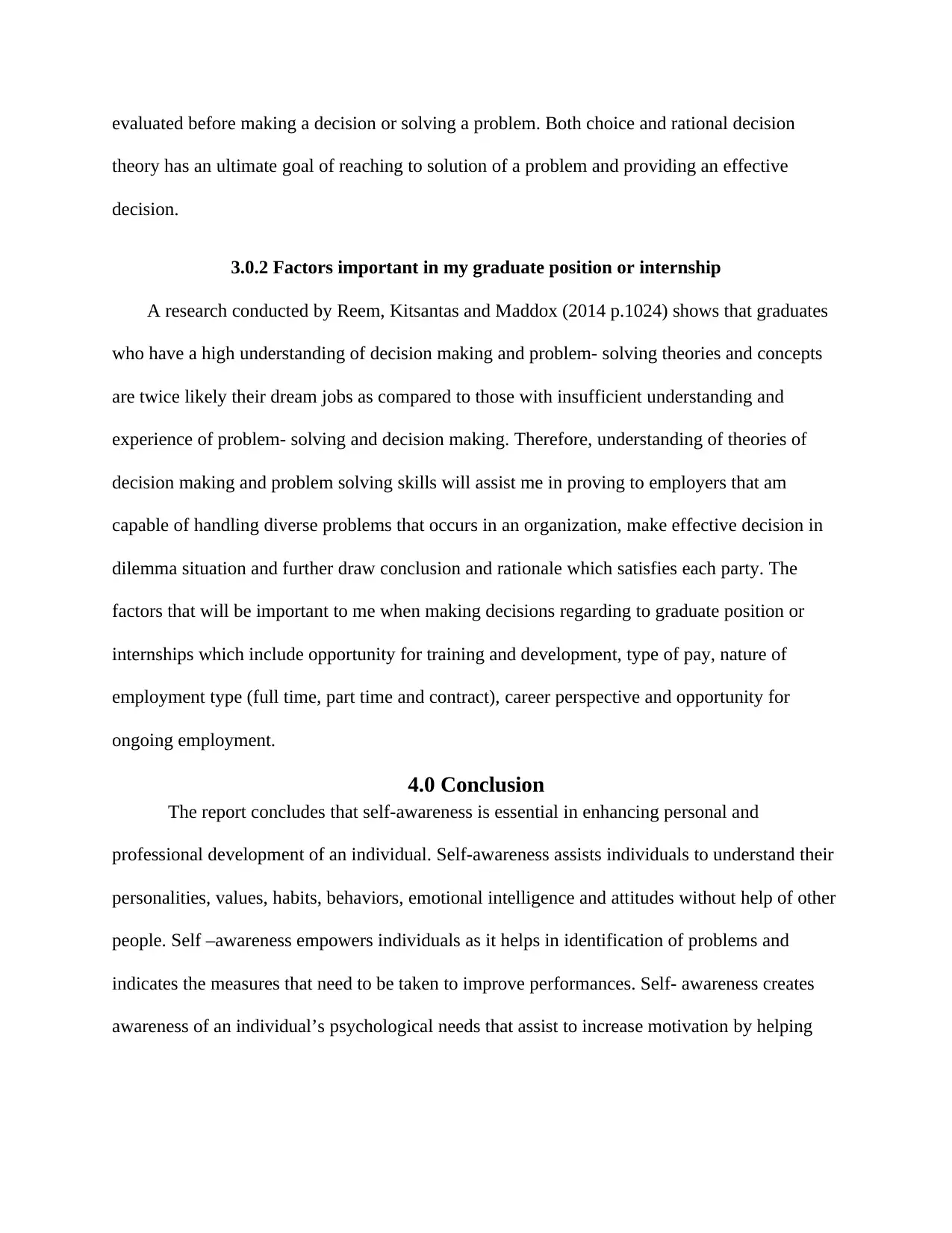
evaluated before making a decision or solving a problem. Both choice and rational decision
theory has an ultimate goal of reaching to solution of a problem and providing an effective
decision.
3.0.2 Factors important in my graduate position or internship
A research conducted by Reem, Kitsantas and Maddox (2014 p.1024) shows that graduates
who have a high understanding of decision making and problem- solving theories and concepts
are twice likely their dream jobs as compared to those with insufficient understanding and
experience of problem- solving and decision making. Therefore, understanding of theories of
decision making and problem solving skills will assist me in proving to employers that am
capable of handling diverse problems that occurs in an organization, make effective decision in
dilemma situation and further draw conclusion and rationale which satisfies each party. The
factors that will be important to me when making decisions regarding to graduate position or
internships which include opportunity for training and development, type of pay, nature of
employment type (full time, part time and contract), career perspective and opportunity for
ongoing employment.
4.0 Conclusion
The report concludes that self-awareness is essential in enhancing personal and
professional development of an individual. Self-awareness assists individuals to understand their
personalities, values, habits, behaviors, emotional intelligence and attitudes without help of other
people. Self –awareness empowers individuals as it helps in identification of problems and
indicates the measures that need to be taken to improve performances. Self- awareness creates
awareness of an individual’s psychological needs that assist to increase motivation by helping
theory has an ultimate goal of reaching to solution of a problem and providing an effective
decision.
3.0.2 Factors important in my graduate position or internship
A research conducted by Reem, Kitsantas and Maddox (2014 p.1024) shows that graduates
who have a high understanding of decision making and problem- solving theories and concepts
are twice likely their dream jobs as compared to those with insufficient understanding and
experience of problem- solving and decision making. Therefore, understanding of theories of
decision making and problem solving skills will assist me in proving to employers that am
capable of handling diverse problems that occurs in an organization, make effective decision in
dilemma situation and further draw conclusion and rationale which satisfies each party. The
factors that will be important to me when making decisions regarding to graduate position or
internships which include opportunity for training and development, type of pay, nature of
employment type (full time, part time and contract), career perspective and opportunity for
ongoing employment.
4.0 Conclusion
The report concludes that self-awareness is essential in enhancing personal and
professional development of an individual. Self-awareness assists individuals to understand their
personalities, values, habits, behaviors, emotional intelligence and attitudes without help of other
people. Self –awareness empowers individuals as it helps in identification of problems and
indicates the measures that need to be taken to improve performances. Self- awareness creates
awareness of an individual’s psychological needs that assist to increase motivation by helping
⊘ This is a preview!⊘
Do you want full access?
Subscribe today to unlock all pages.

Trusted by 1+ million students worldwide
1 out of 14
Related Documents
Your All-in-One AI-Powered Toolkit for Academic Success.
+13062052269
info@desklib.com
Available 24*7 on WhatsApp / Email
![[object Object]](/_next/static/media/star-bottom.7253800d.svg)
Unlock your academic potential
Copyright © 2020–2026 A2Z Services. All Rights Reserved. Developed and managed by ZUCOL.





